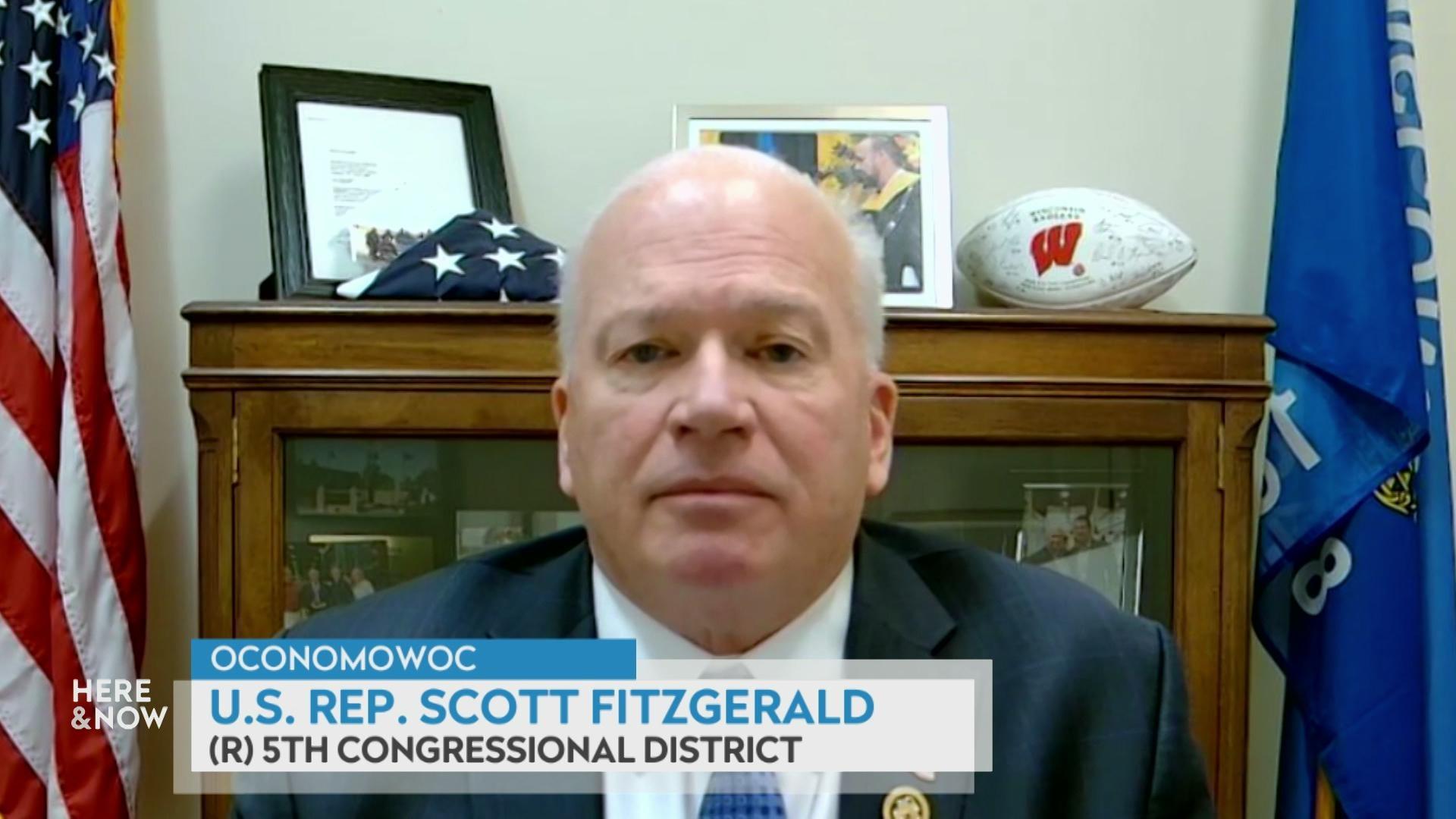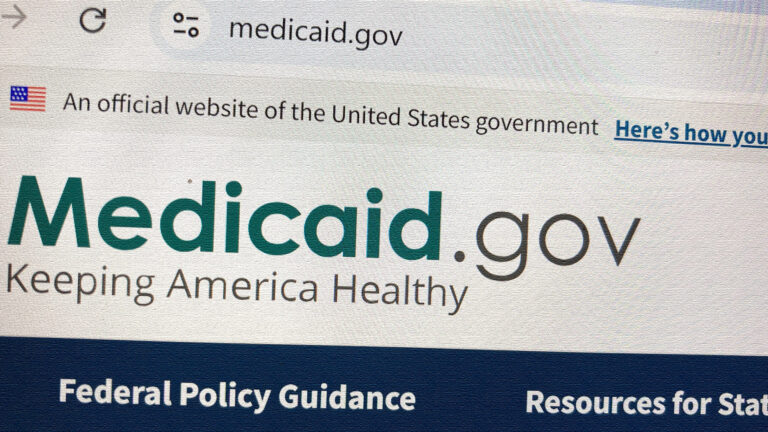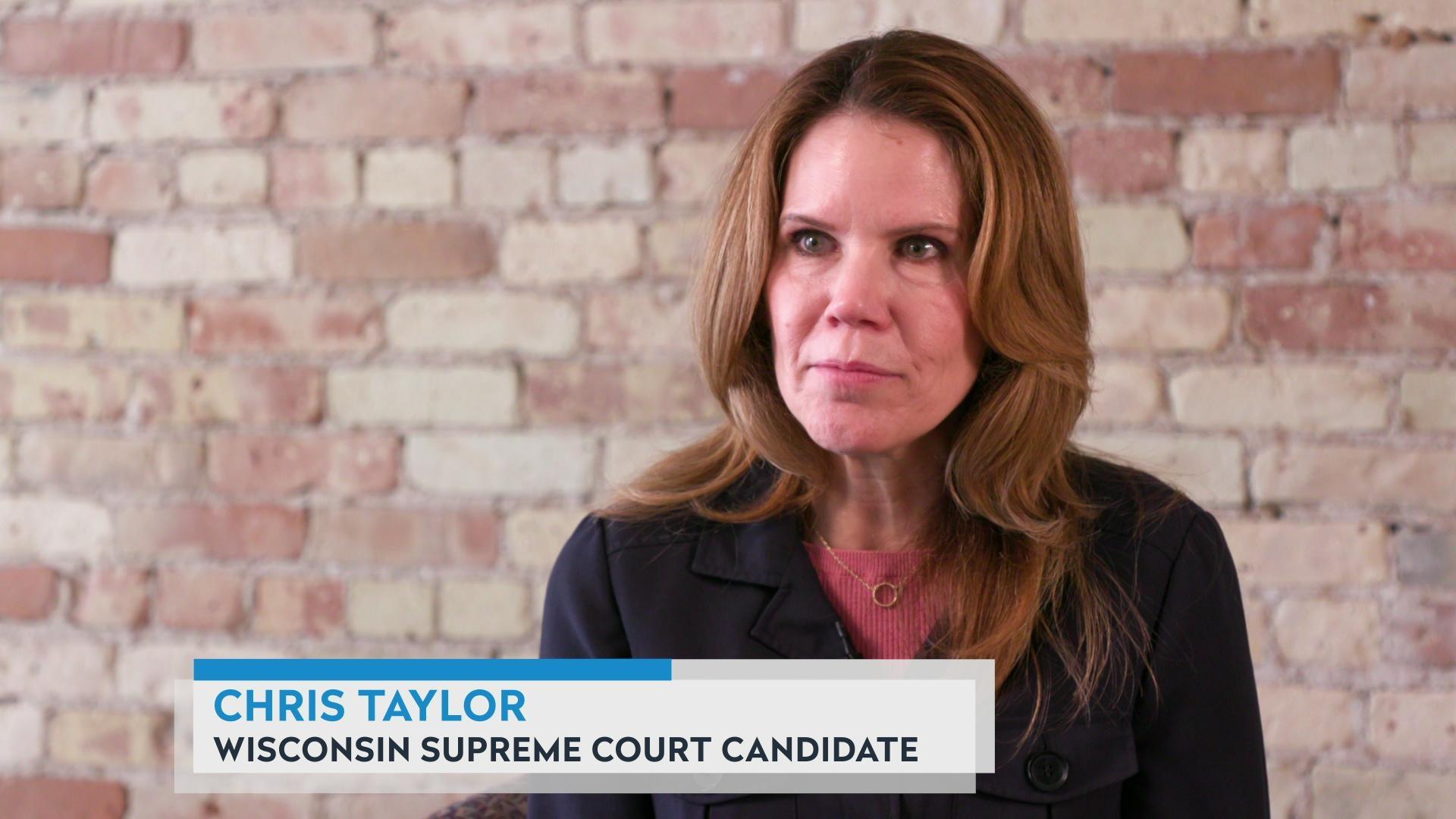Misinformation flowed at Wisconsin Assembly transgender bills hearing — here are facts on gender-affirming care and trans athletes
Republican lawmakers have introduced bills that would ban gender-affirming care for transgender youth and regulate transgender participation in high school and college sports in Wisconsin.
Wisconsin Watch
October 11, 2023

Kristin Dahnert testifies about her experience as a transgender woman from Wisconsin during an Assembly Committee on Education hearing on Oct. 4, 2023, at the Wisconsin State Capitol in Madison. Legislation discussed at the hearing would require K-12 athletes to participate on teams that reflect their "sex determined at birth by a physician and reflected on the birth certificate." (Credit: Ruthie Hauge / The Cap Times)

This article was first published by Wisconsin Watch.
At Oct. 4 public hearings on bills that would ban gender-affirming care for transgender youth and their participation on sports teams that align with their gender identity, misinformation abounded. Lawmakers asked questions indicating a lack of basic knowledge about the topic.
Here are some of the questions raised and the facts.
Where did Wisconsin’s bill banning gender-affirming care for trans youth come from?
Wisconsin’s proposed youth gender-affirming care ban, named the “Help Not Harm Act,” is based off of model legislation with the same name from the Family Policy Alliance. Various versions have passed in 20 states.
FPA is a right-wing Christian lobbying group that believes all levels of government should follow a “biblical worldview.” It argues laws should reflect that “God created mankind male and female,” which “cannot be changed.”
FPA’s “sister ministry,” the Family Policy Foundation, trains lawmakers in a “Christian worldview” at the Statesmen Academy, which an Insider and Type Investigations report dubbed the “Christian nationalist boot camp pushing anti-trans laws across America.”
Bill author Rep. Scott Allen, R-Waukesha, graduated from the program. Wisconsin Watch obtained records from his office showing Allen attended in November 2021 a webinar hosted by FPA to glean “the information and tools needed to pass Help Not Harm Legislation.”

State Sen. Duey Stroebel, R-Saukville, and Rep. Scott Allen, R-Waukesha, testify before the Assembly Committee on Health, Aging and Long-Term Care about legislation they authored that would ban gender affirming care for anyone under 18. The hearing was held at the Wisconsin State Capitol in Madison, on Oct. 4, 2023. (Credit: Ruthie Hauge / The Cap Times)
The invitation touted Arkansas’ S.A.F.E. Act ban as a successful example. A federal judge struck down the ban in June, finding it violated equal protection under the Constitution and the state failed to prove that the banned procedures were more dangerous than other types of healthcare allowed for children.
FPA has partnered with a network of far-right, mostly Christian groups — several of which the Southern Poverty Law Center designates as hate groups and one which has stated its intent to deny access to gender-affirming care for people of all ages — to advance anti-LGBTQ+ policies nationwide.
At what age do gender-affirming treatments become available?
Standards of care from the World Professional Association of Transgender Health, followed by Wisconsin’s two clinics serving transgender youth, outline when youth can access certain gender-affirming treatment.
Medical interventions are not available until puberty, which is typically between ages 8-14. Before a child reaches puberty, gender-affirming care may include social transition (changing names, pronouns, hair style or clothes) and mental health counseling.
Medications that become available during puberty, such as puberty blockers or hormone therapy, are offered only after the child undergoes a thorough assessment by a multidisciplinary team of medical providers, which may spur mental health treatment to address coexisting symptoms. They also must receive a diagnosis of gender incongruence and their parents must give informed consent.
Gender-affirming surgeries are primarily available for adults. Neither UW Health nor Children’s Wisconsin perform genital surgery on patients under 18. Children’s Wisconsin also no longer provides gender-affirming chest, “top,” surgery on patients under 18 for logistical reasons: the “average age of past gender affirming surgical patients was over 17” and entailed a “very small number of cases” since 2016.
UW Health may consider performing chest masculinization surgery for patients under 18 “only after multidisciplinary evaluation, a letter of support from your mental health provider and with informed consent from all legal guardians.” The hospital says it is rare, with about five to 10 “older teenage patients” under 18 receiving chest masculinization surgery per year.
Can children receive gender-affirming care without parental consent?
No. Both Children’s Wisconsin and UW Health, which house the state’s only clinics dedicated to serving transgender youth, require parental consent before prescribing puberty blockers or hormone therapy. Gender-affirming surgery before age 18 also requires parental consent.
Some schools in Wisconsin allow youth to self-identify their name and pronouns and do not “out” them to parents. However, the conservative Wisconsin Institute for Law and Liberty has filed challenges against that approach in three school districts, winning a recent case it filed in partnership with a Christian nationalist anti-LGBTQ+ group against the Kettle Moraine School District in Waukesha County.

Bill Blanton writes words of support and affirmation on the steps of the Wisconsin State Capitol during a rally for transgender rights in Madison, Wis., on Oct. 4, 2023. (Credit: Ruthie Hauge / The Cap Times)
At least four school districts have passed policies requiring parental consent before referring to a trans child with a chosen name or pronoun, and others have considered policies drafted by WILL.
What does science say about gender-affirming care?
Gender-affirming care refers to a variety of social, legal and medical steps transgender people may take to live authentically. It is the only evidence-based treatment for gender dysphoria and is endorsed by every major medical association in the United States.
At least 17 studies as of 2023 have established this care is safe and effective. Puberty blockers, the first medication offered as part of gender-affirming care, have been studied and safely administered to cisgender children for decades.
“The fact that AB465 allows puberty blockers to remain available for cisgender children, but not trans children, demonstrates that safety is not the motivation for this bigoted bill,” testified Stephanie Farrar, an English professor at University of Wisconsin-Eau Claire.
Any benefits are carefully weighed against any risks in detailed discussions between patients, parents and providers.
In creating its standards of care, WPATH reviewed existing research and determined the “emerging evidence base indicates a general improvement in the lives of transgender adolescents who, following careful assessment, receive medically necessary gender-affirming medical treatment.” Peer-reviewed research has found that this care betters the lives of people with gender dysphoria through improved mental health outcomes.
Allen claimed there’s insufficient “high quality” evidence to “suggest” that gender-affirming care helps. This is a common disinformation tactic used to challenge this care, said Dr. Meredithe McNamara, assistant professor of pediatrics at the Yale School of Medicine. In scientific research, “high quality” evidence means randomized trials and “low quality” means observational studies.
“Randomization to no treatment is unethical, as the benefits of (gender-affirming care) are well established, and it is impossible because the effects of placebo versus treatment would be readily detectable by patients and providers,” McNamara and her colleagues wrote in a paper.
How many trans youth “grow out of it”?
The most current research shows that the vast majority of youth who socially transition at an early age continue to identify as transgender. A study published last year in the journal Pediatrics followed 317 transgender youth in the United States and found that an average of five years later, 94% continued to identify as binary transgender, and another 3.5% moved from identifying as a trans boy or trans girl to nonbinary.
Prior studies had indicated higher levels of what’s known as “desistance.”
Many of the studies rely on outdated diagnoses with more lax criteria, meaning some of the people found to have “desisted” would not have been diagnosed with gender dysphoria today. For example, Allen claimed in his co-sponsorship that up to 98% of children with gender dysphoria will reconcile their sex and gender during puberty. That number comes from a 1987 study.
Another often-cited study categorized anyone who did not return to the clinic as desisting — without knowing whether that was actually the case.
Why not limit gender-affirming care to adults?
Forcing a transgender child to go through a puberty that is inconsistent with their gender identity is, from a human rights perspective, not neutral, according to the WPATH standards of care.
Research has found that trans youth who want but can’t access puberty blockers or hormones have two to three times higher levels of depression and suicidality compared with those who have access.

Supporters of transgender rights gather outside the Wisconsin State Capitol in Madison, on Oct. 4, 2023. (Credit: Ruthie Hauge / The Cap Times)
At the hearing, Silviana Amethyst, a trans woman and math professor at UW-Eau Claire, told lawmakers that because she transitioned as an adult, after undergoing the wrong puberty in adolescence, “I spent a significant portion of my income removing my beard, shaping my face in my neck and doing voice therapy. I’ve experienced discrimination and humiliation in public spaces because of the visible remnants of masculinity on my face in my body, and I live in daily fear.”
“Many of those challenges could have been spared if I could have transitioned earlier in life,” she said.
What does the “Swedish study” say about gender-affirming care?
In both his testimony and a video, Allen misrepresented the findings of what’s known as the “Swedish study,” which followed Swedes who received gender-affirming surgery from 1973-2003, a time period when transgender people faced far more adversity.
The study found transgender people who received gender-affirming surgery — not just anyone who transitioned — have a higher rate of suicide than the general population.
But the study didn’t compare trans people who received gender-affirming surgery with those who wanted and were denied it. The study cautioned: “the results should not be interpreted such as sex reassignment per se increases morbidity and mortality. Things might have been even worse without sex reassignment.”
The researchers noted increased suicide rates have been found for those treated for bipolar disorder and schizophrenia, “but it does not follow that mood stabilizing treatment or antipsychotic treatment is the culprit.”
Recent research has found that trans youth who have access to gender-affirming care have 73% lower odds of suicidality.
What have various European countries done about gender-affirming care?
No European country has implemented blanket bans on gender-affirming care for transgender youth as some American states have done.
In his co-sponsorship memo, Allen claimed that medical authorities in Sweden, Finland, and the United Kingdom “recently abandoned” recommending drugs and procedures as “first-line treatment” for gender dysphoric minors.
However, medications and surgeries have never been “first-line treatment” for trans youth. The first steps are typically affirmation, social transition and mental health counseling.
Sweden has tightened its guidelines since 2015, only permitting puberty blockers and hormone therapy to youth in “exceptional cases.” Three factors prompted the change: a “continued lack of reliable scientific evidence concerning the efficacy and the safety of both treatments,” the “new knowledge that detransition occurs among young adults” and “the uncertainty that follows from the yet unexplained increase in the number of care seekers.”
Finland’s 2020 guidelines recommend psychosocial support first, but still allow puberty blockers and hormone therapy on a “case-by-case” basis after thorough examination.
Bill sponsor Rep. Donna Rozar, R-Marshfield, misrepresented events in the U.K. when she claimed that the National Health Service “banned the use of puberty blockers and hormone drugs on minors.” The publicly funded healthcare system issued an “interim policy” saying it would no longer “routinely” offer puberty blockers to youth, but it would still provide them in “exceptional circumstances” and in research settings, according to the Associated Press.
And while the U.K. does plan to close its Gender Identity Development Service Clinic in March, it is largely due to criticisms that one facility was inadequate to meet patients’ needs. An interim report by an independent reviewer called for “regional centers.”
What do the WIAA and NCAA say about participation of trans athletes?
Rep. Barbara Dittrich, R-Oconomowoc, and Sen. Daniel Knodl, R-Germantown, have introduced legislation that requires K-12 and collegiate sports to designate teams as “male,” “female” or co-ed and require athletes to participate on teams that reflect their “sex determined at birth by a physician and reflected on the birth certificate.”

State Rep. Barbara Dittrich, R-Oconomowoc, and Sen. Dan Knodl, R-Germantown, testify before the Assembly Committee on Colleges and Universities at the Wisconsin State Capitol in Madison, on Oct. 4, 2023. (Credit: Ruthie Hauge / The Cap Times)
At the hearing, Rep. Kristina Shelton, D-Green Bay, noted that there are 151,000 Wisconsin students who participate in K-12 athletics, including 63,000 girls. Dittrich said she has heard of only half a dozen transgender student-athletes.
A Wisconsin Interscholastic Athletic Association (WIAA) policy on transgender athletes instructs each school to determine whether transgender students are eligible to participate on teams aligning with their gender identity on a case-by-case basis.
The process entails detailed submissions, including a written statement from the student affirming their “consistent gender identity and expression,” documentation from others — such as parents, friends or teachers — affirming that identity, a letter from a health-care professional affirming the student’s transgender identity and medical documentation. Transgender girls must have “one calendar year of medically documented testosterone suppression therapy to be eligible to participate on a female team.”
The National Collegiate Athletic Association (NCAA) takes a sport-by-sport approach to its transgender participation policy, which includes providing documentation that athletes meet the testosterone levels set by their sports.
What does science say about whether trans people have a competitive edge in sports?
Trans athletes have not been dominant in women’s sports. And most available evidence deals with elite adult athletes, not middle and high school athletes.
“We have relatively little firm scientific data to determine whether there is a biological advantage for the person who is born with XY chromosomes consistent with being assigned male at birth and exposed to testosterone,” University of Washington endocrinologist Bradley Anawalt said in April.
The Canadian Centre for Ethics in Sport reviewed English-language studies from 2011-21 examining transgender athlete’s participation in elite sports. The review found biological data is “severely limited” and “often methodologically flawed,” but that available “evidence indicates trans women who have undergone testosterone suppression have no clear biological advantages over cis women in elite sport.”
The review also found there is “no basis for athletic advantage conferred by bone size or density,” something Dittrich mentioned in her testimony.
Eric Vilain, a geneticist who studies the differences in sex development, told NPR in April that boys and men have a performance advantage over girls and women that increases after puberty, but that “the difference will be much smaller, of course, in elementary school, before puberty, than in high school.”
“Some are making the argument that the difference between boys and girls should translate directly into concluding that there will be the same difference between trans and cisgender girl athletes,” Vilain said. “But there is no good evidence for this, in part because many cases are going to be different, some having undergone blocking of puberty at different ages.”
Anawalt emphasized any “prospective advantages of strength would be greatly or completely reduced” for trans girls who take puberty blockers and hormone replacement therapy, but long-term studies are needed.
The nonprofit Wisconsin Watch collaborates with WPR, PBS Wisconsin, other news media and the University of Wisconsin-Madison School of Journalism and Mass Communication. All works created, published, posted or disseminated by Wisconsin Watch do not necessarily reflect the views or opinions of UW-Madison or any of its affiliates.
 Passport
Passport











Follow Us